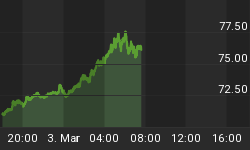These are two common refrains from mainstream economists who never foresaw a recession until it already had been declared by the NBER. Today we received some information that ought to give these mainstreamers pause for thought.
Wal-Mart, the largest retailer in the world, reported a lower-than-expected quarterly profit and cut its full-year earnings forecast. Chief Executive Lee Scott blamed Wal-Mart's disappointing performance on economic pressure around the world. Said Mr. Scott, "It is no secret that many customers are running out of money toward the end of the month." In order to chum-up sales, Wal-Mart is slashing prices on thousands of items, which, of course, will force its competitors to do the same.
Although pointy-headed economists continue to be positive on the U.S. consumer, investors have soured on this space, as evidenced by the chart below that shows the behavior of an index of U.S. retailing stocks. The index is down almost 14% from its mid-February highs. I seem to recall in late 2005 when a similar index of homebuilder stocks was falling that these same pointy-headed economists couldn't see the housing recession forming on the horizon.
Chart 1
Now, for the vaunted global growth story. Not 24 hours after the second-largest economy in the world, Japan, reported absolutely weak and weaker-than-expected second-quarter real GDP growth, the second largest economic region, the Eurozone, reported absolutely weak and weaker-than-expected second-quarter real GDP growth. Quarter-to-quarter annualized Eurozone real GDP growth slipped to 1.4% in the second quarter vs. 2.9% in the first. On a year-over-year basis, Eurozone real GDP growth edged down to 2.5% in the second quarter vs. 3.1% in the first. The unexpected weaker Eurozone growth calls into question two things - the policy rate increase by the ECB penciled in for September and the locomotive to pull the U.S. economy out of its funk.
















